Director, Deputy Director,
independent members &
members at other sections
- Director: Hidehiko Komine, Ph.D.
- Deputy Director: Nana Itoh, Ph.D.
- Deputy Director: Toshihisa Sato, Ph.D.
- Principal Research Manager: Noriyuki Higo, Ph.D.
Independent members
- Prime Senior Researcher: Yuji Takeda, Ph.D.
- Chief Senior Researcher: Takanori Shibata, Ph.D.
Members at other sections
- Sunao Iwaki, Ph.D.
- Masataka Goto, Ph.D.
- Kosetsu Tsukuda, Ph.D.
- Takemasa Yokoyama, Ph.D.
- Minako Hosonoa, Ph.D.
- Manabu Chikai, Ph.D.
- Noriaki Kanayama, Ph.D.
- Tran Yen, Ph.D.
- Jun Sugawara, Ph.D.
- Takashi Tarumi, Ph.D.
- Tsubasa Toumoto, Ph.D.
- Takafumi Ando, Ph.D.
- Yasuko Sugase, Ph.D.
- Nobuo Kunori, Ph.D.
Mental and Physical Functions Modeling Group
- Leader: Kentaro Katahira, Ph.D.
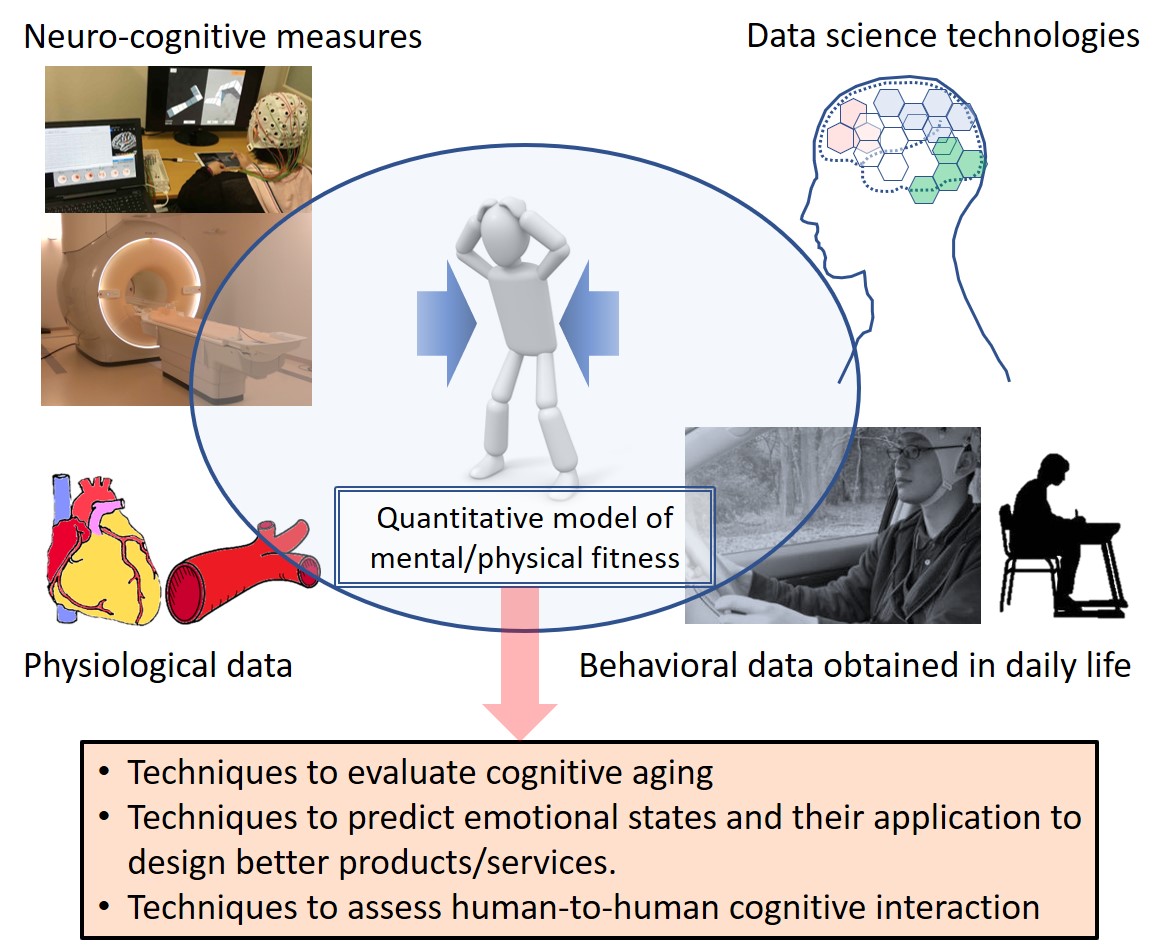
Mental and Physical Functions Modeling Group (MPFMG) focuses on developing techniques to evaluate mental and physical fitness by integrating neurocognitive measures such as EEG/(f)MRI, physiological data from cardiovascular systems (EEG etc.), and behavioral data acquired in daily life with data science technologies. Our research area includes neuro-behavioral studies of cognitive aging, human emotional processing, and human-to-human communication. We also conduct research to apply our findings to improve quality-of-life of elderly people, to support better products and/or service design, and to understand human-to-human cognitive interaction.
Mathematical Neuroscience Research Group
- Leader: Jun-ichiro Hirayama, Ph.D.
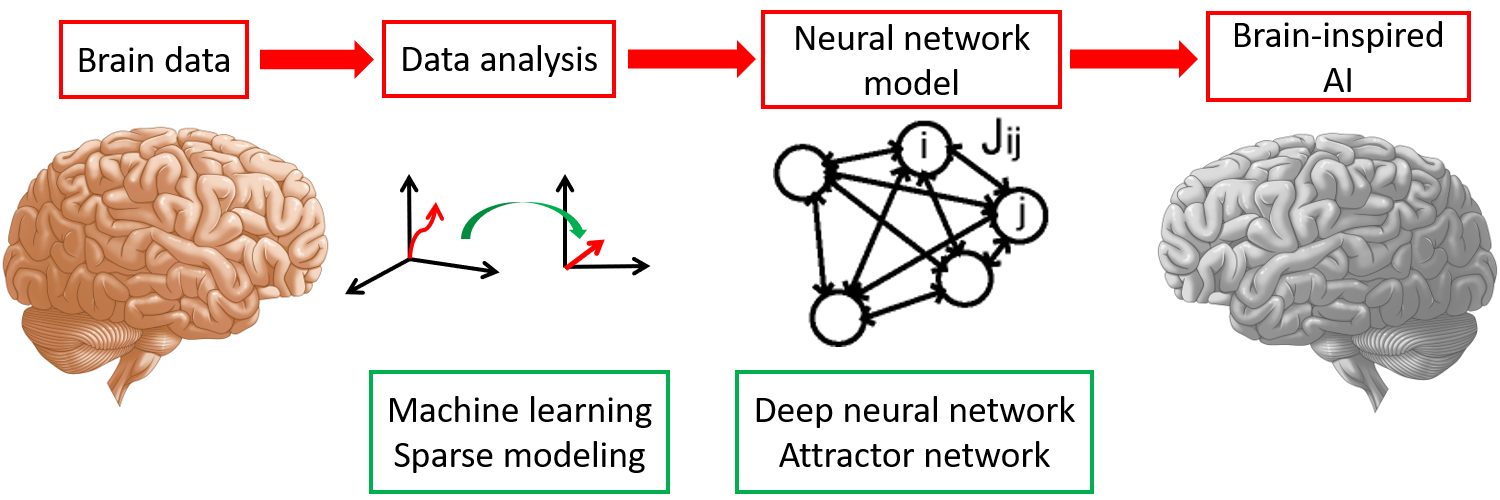
Brain can perform complex information processing tasks such as pattern recognition and learning more flexibly than existent technologies. The aims of this group are to elucidate the mechnisms underlying information processing in the brain by analyzing brain data with mathematical methods like machine learning or sparse modeling, and to develop a brain-inspired artificial intelligence. Furhermore, these methods and models are analyzed by mathematical methods to mesuare their performance limit and generalization performance.
Neuroscience Technology Research Group
- Leader: Aya Takemura, Ph.D.
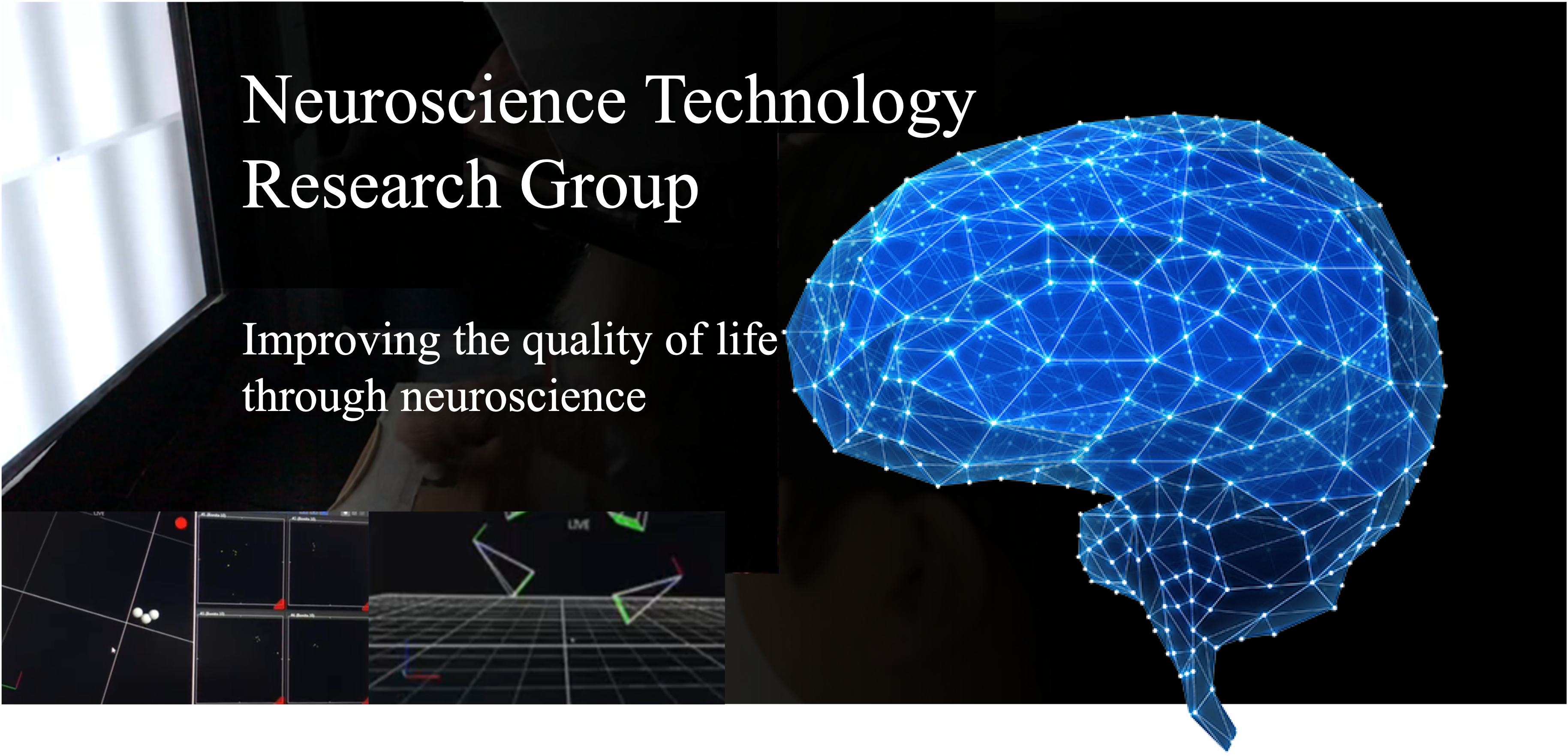
The Neuroscience Technology Research Group conducts experimental and theoretical research to understand the neural basis of brain functions realized by parallel and hierarchical information processing. The mission of our research group aim to understand physiological and anatomical changes in the neural mechanisms for brain function that bring about changes and improvements in the cognition of sensory and motor behavior and learning ability, and to use the knowledge gained and to develop functional enhancement techniques, neurotechnology, next-generation artificial intelligence technology, and innovative neurorehabilitation technologies on the basis of scientific evidences for realization of sustainable society with a long health life span.
Biomedical Sensing Research Group
- Leader: Noriyuki Higo, Ph.D.
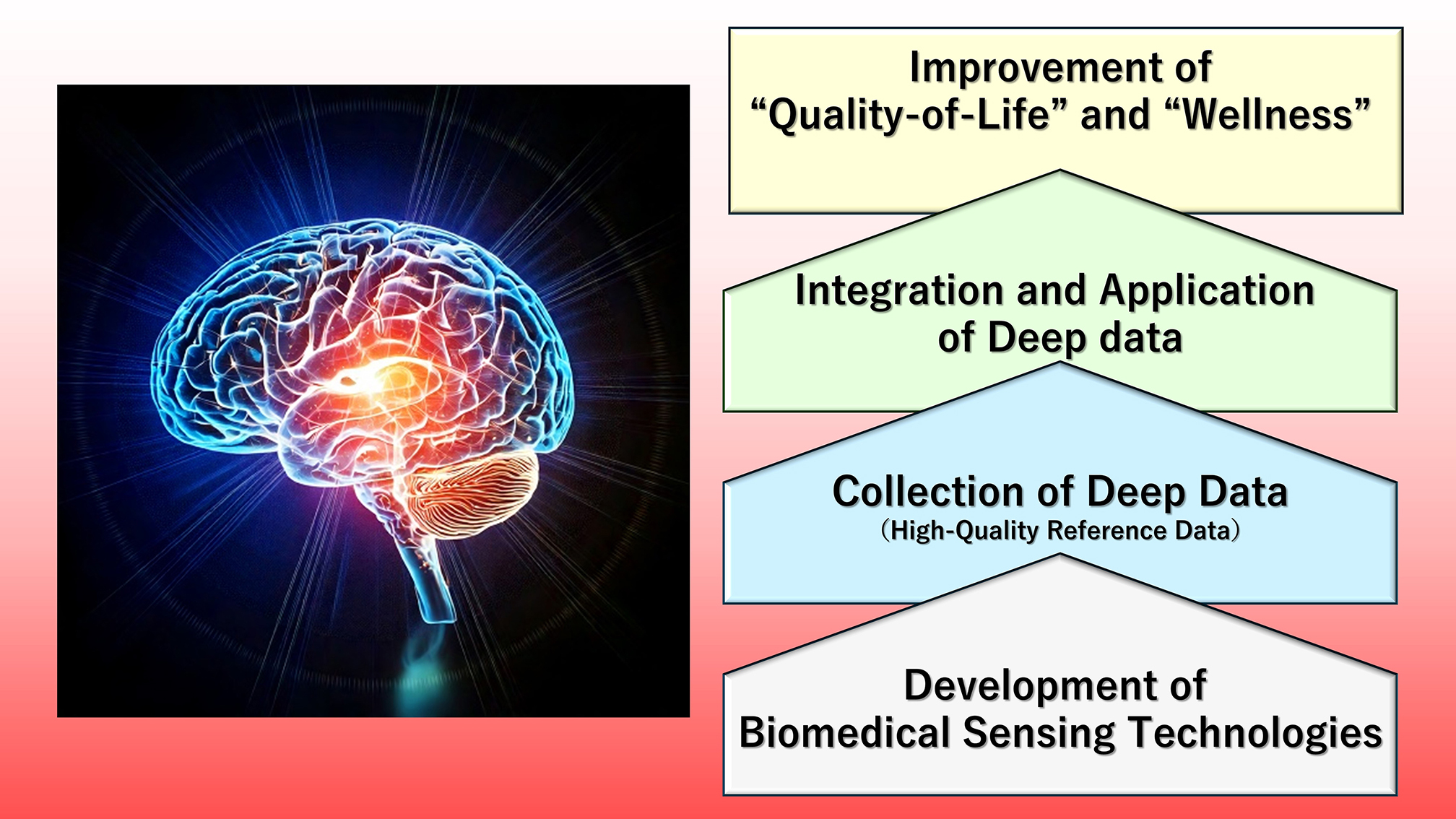
The mission of research group is to develop technologies that can sustain and improve Quality-of-Life
and Wellness
of people, including children and older adults with various health conditions. To accomplish our goal, we will establish technologies and experimental systems for high-sensitivity biomedical sensing of brain and other biological functions, accumulate deep data (i.e., high-quality reference data) on the biological functions, and integrate and utilize the deep data obtained.
Behavior Information Design Group
- Leader: Nana Itoh, Ph.D.
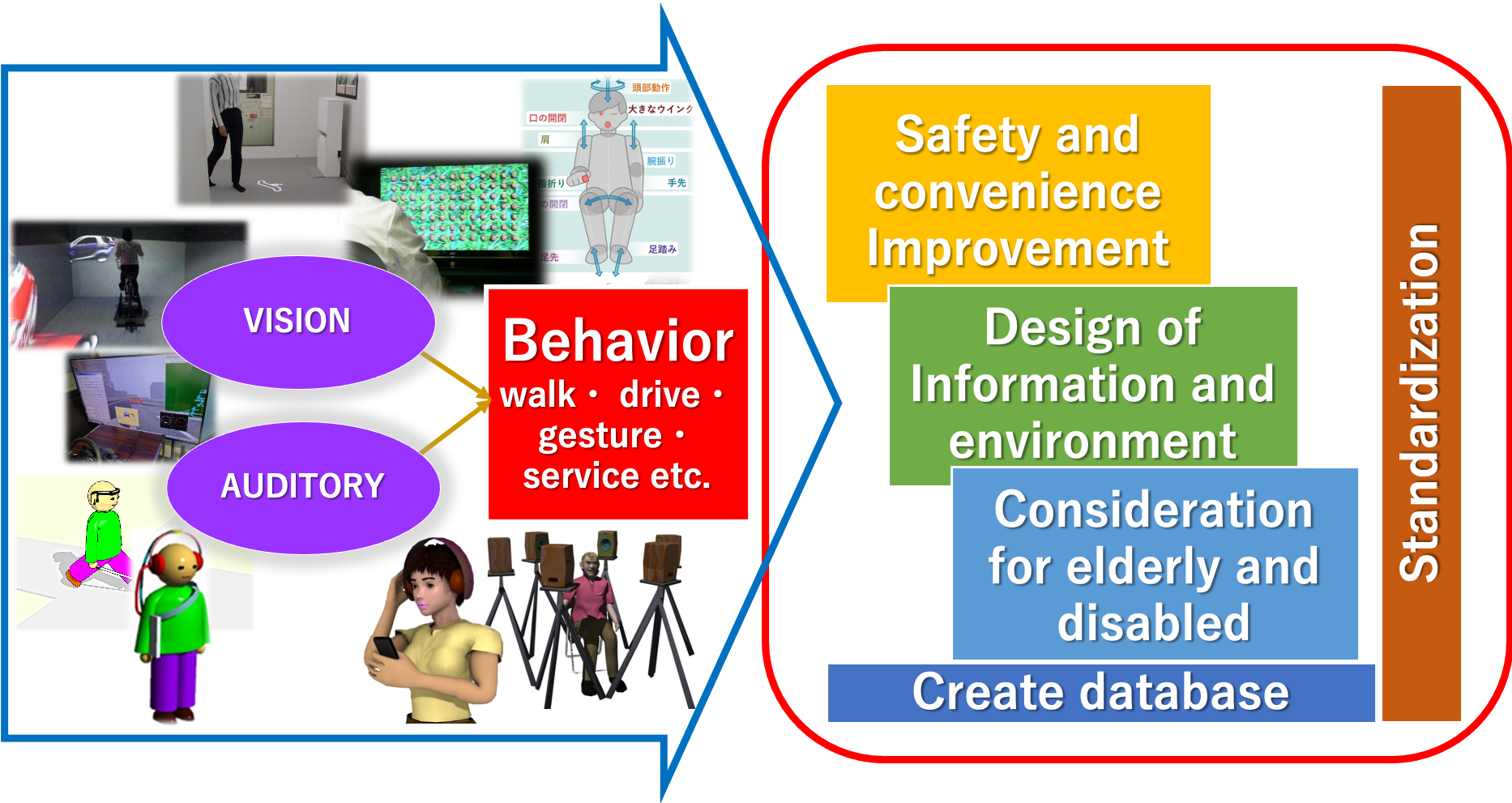
The Behavior Information Design Research Group will elucidate the dynamic sensory characteristics of the human beings and their effects on behavior. We aim to contribute to a society where various people, including the elderly and the disabled, can live safely, actively and happily.
Media Interaction Group
- Leader: Tomoyasu Nakano, Ph.D.

The Media Interaction Group targets a variety of media content (music, video, text, user activities, physical devices, etc.) and conducts research on media interaction technologies that can enrich people's life. In particular, our group aims to promote content creation and utilization and enhance the creativity of the society by bridging the gap between creators and consumers. Toward this goal, we develop value-creation support technologies that facilitate content creation by complementing knowledge, experience, and technique of creators. We also develop value-enhancement support technologies that provide consumers with various means of appreciation, retrieval, recommendation, and browsing. These media technologies and interaction technologies demand a broad range of basic and applied research. We conduct research on music information processing, singing information processing, human-computer interaction, web services, signal processing, machine learning, retrieval and recommendation, computer graphics and animation, visualization and auralization, crowdsourcing, community analysis and support, large-scale data processing, etc.
Human Behavior Research Group
- Leader: Ken Kihara, Ph.D.
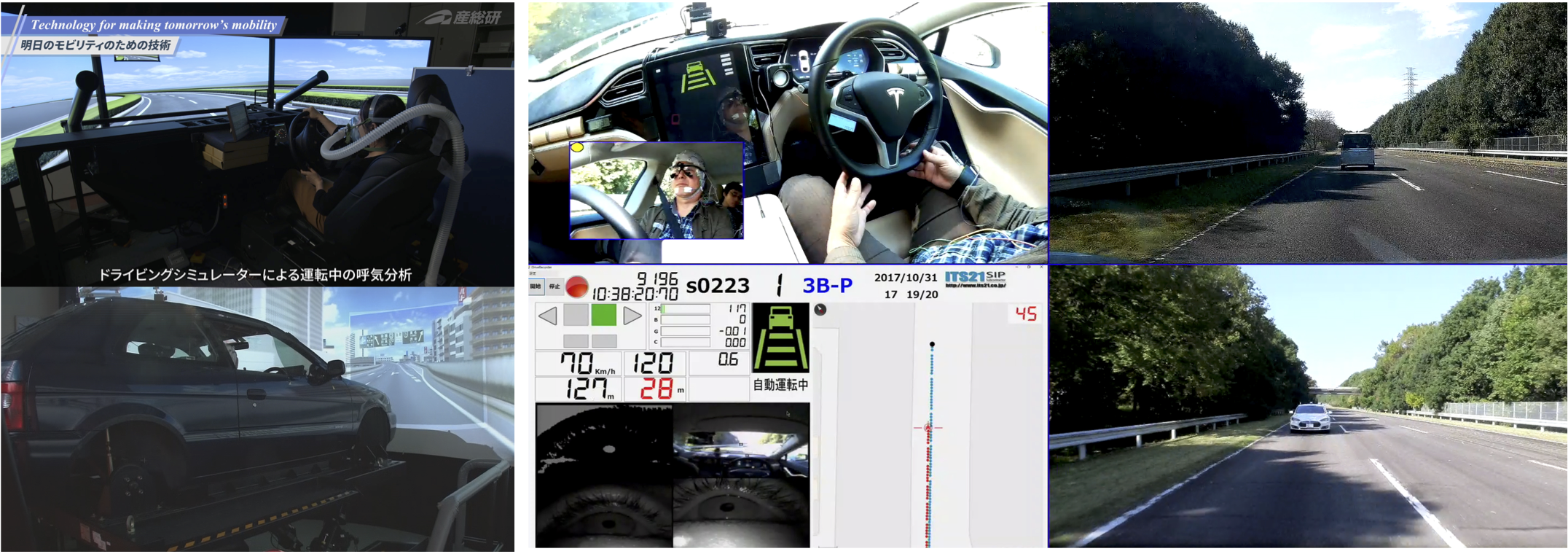
We have developed measurement and evaluation methods of human behaviors. Our aims are to investigate the critical factors influencing behaviors during an interaction between the human and the system, to clarify a mechanism of the human behaviors, and to propose new mobility that is adaptive to automated and connected transportation. The team members are researchers focusing on behavior analysis, attention and HMI, stimulus-response compatibility effect, computational modelling, and energy metabolism and lifestyle habit. Our experiments have been conducted in experimental rooms, AIST driving simulator, AIST proving ground, and public roads.
The followings are our research topics:
- Estimation of driver conditions in automated driving
- Evaluation of driving skills and cognitive functions of elderly drivers
- Investigation of driving pleasure while moving and operating
Cognitive Functions Research Group
- Leader: Motohiro Kimura, Ph.D.
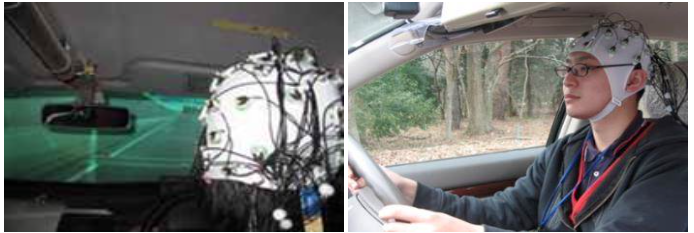
In our research group, we investigate cognitive functions, such as perception, attention, memory, learning, decision, and emotion related to human mobility by measuring brain functions, peripheral physiological responses, eye-movements, and behavior. We have developed unique techniques that are available to estimate driver’s attention and driving pleasure depending on electroencephalographic (EEG) signals. By using such techniques, we perform basic and applied researches to reduce the disincentive problems and improve the values in mobility
Sumitomoriko-AIST
Advanced Devices of Polymer Materials
Cooperative Research Laboratory
- Leader: Kensuke Sasai
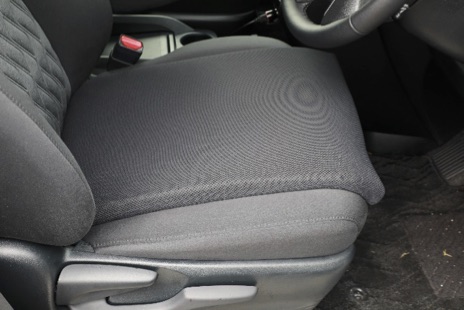
Smart Rubber (SR)sensor built into the seat or installed on the seat surface with a cushion shape. From the results, we estimate the driver's condition such as fatigue, drowsiness, and signs of sudden illness, and connect it to services such as warning, operation of the driving support system, and notification to the outside.
Sumitomo Riko-AIST Advanced Devices of Polymer Materials Cooperative Research Laboratory was established to contribute to the safety, security, and comfort of people’s life by combining the advanced technology cultivated by Sumitomo Riko with the results of AIST's research and development. Specifically, we will clarify the capability of the estimation of the information and the human state by the experimental research that reproduces actual driving using a vehicle equipped with a sensing device. Among them, we will improve the comprehensive evaluation technology (advanced sensory quantification technology and data analysis technology, technological innovation by fusing existing and digital technology), and establish various technologies under development to add high value. We aim to contribute to the further development of the mobility society by creating product groups and solutions.

 Japanese
Japanese